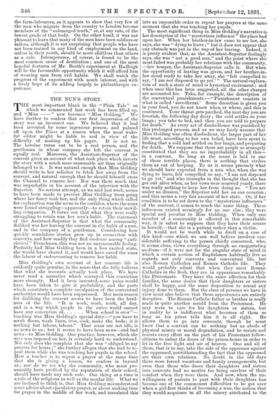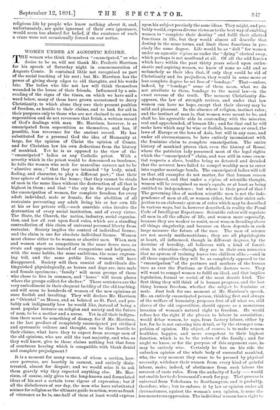THE NUN'S STORY. T HE most important blank in the -"Plain
Tale" on which we commented last week has been filled up, and " Miss " now becomes " Miss Golding." We have further to confess that our first impression of the story was an incorrect one. We believed that it had been invented by some ingenious person, and palmed off upon the Times at a season when the most wake- ful editor might be liable to nod, in view of the difficulty of making up his paper. It is not so. The heroine turns out to be a real person, and the gentleman in whose company she left the convent is equally real. Moreover, the Assistant-Superior of the convent gives an account of what took place which invests the story with a much more reasonable air than originally belonged to it. It was natural enough that Miss Golding should write to her solicitor to fetch her away from the convent, and natural enough that he should himself cross the Channel to remove her. Nor was there much that was improbable in his account of the interview with the Superior. No serious attempt, as we said last week, seems to have been made to prevent Miss Golding from going where her fancy took her, and the only thing which called for explanation was the scene in the corridor, where the nuns were found struggling—apparently—to retain their unwil- ling companion. It turns out that what they were really struggling to retain was her nun's habit. The statement of the Assistant-Superior is that what the community disliked was her leaving the convent in the habit of a nun, and in the company of a gentleman. Considering how quickly scandalous stories grow up in connection with convents, and how readily they find credence among " anti- clerical " Frenchmen, this was not an unreasonable feeling. Probably had Miss Golding been in a less excited state, she would have shared it, and would have saved the nuns the labour of endeavouring to remove her habit.
Miss Golding's own account of her convent life is evidently quite genuine, in the sense that she fully believes that what she recounts actually took place. We have never read a narrative which conveyed this conviction more strongly. Had it been invented, some pains would have been taken to give it probability, and the parts which constitute a complete exculpation of the conventual authorities would have been suppressed. Her main reason for disliking the convent seems to have been the hard- ness of the life. " It is work, work, work, all day, and in a way which people in the outer world cannot have any conception of When school is over"— teaching was Miss Golding's special duty—" you have to scrub floors, wash linen, iron, cook, make the beds ; it is nothing but labour, labour." That nuns are not idle, is no news to us ; but it seems to have been news—and bad news—to Miss Golding. One practice, however, which she says was imposed on her, is certainly hard to understand. Not only does-she complain that she was " obliged to say prayers for hours ;" she further alleges that she had to re- peat them while she was teaching her pupils in the school. How a teacher is to repeat a prayer at. the same time that she is giving a lesson, we confess is beyond us ; nor do we see why the community, who must pre- sumably have profited by the reputation of their school, should have made any such rule. One thing at a time is a rule of the religious as well as the secular life. What we are inclined to think is, that Miss Golding misunderstood some advice about ejaculatory prayer, or about making time for prayer in the middle of her work, and translated this into an impossible order to repeat her prayers at the same moment that she was teaching her pupils. The most significant thing in Miss Golding's narrative is her description of the " mysterious influence " the place had upon her. When her brother-in-law came to see her, she says, she was " dying to leave ; " but it does not appear that any obstacle was put in the way of her leaving. Indeed, it is pretty evident that, as the Assistant-Superior feelingly says, she was " not a good nun," and the point where she most failed was probably her relations with the community, —her temper, the Assistant-Superior calls it. But when the opportunity of leaving was given, and her brother-in- law stood ready to take her away, she " felt compelled to say, I am not disposed to go yet. " The natural explana- tion of such a state of mind is hysterical excitement ; and when once this has been _suggested, all the other charges are accounted for. Take, for example, the description of the conventual punishments :—" Punishment consists in what is called sore-throat.' Some decoction is given you in your food, you do not know when or where, and this is continued. Your throat gets parched, the next day you are feverish, the following day dizzy ; the cold settles on your lungs ; you take to bed, and then you are told to prepare for death." As every act of disobedience was punished by this prolonged process, and as we may fairly assume that Miss Golding was often disobedient, the larger part of her life must, according to her own belief, have been spent in finding that a cold had settled on her lungs, and preparing for death. We suppose that there are people so strangely constituted that they see no improbability in all this— in a convent. So long as the scene is laid in one of these terrible places, there is nothing that strikes them as out. of keeping. To us it seems precisely what we should have expected from a nuu who, when she was dying to leave, felt compelled to say, " I am not disposed to go yet," and who triumphs in the thought that she has got out alive when, as her vows were renewed yearly, there was really nothing to keep her from doing so. " You are under an illusion," the Superior told her on one occasion ; and this seems a. very fair account of her state. Or, if her condition is to be set down to the " mysterious influences " of the convent, it comes to much the same thing. These influences existed seemingly for no one else ; they were special and peculiar to Miss Golding. When only one member of a community is affected in this remarkable way, it is safest to suppose that they have their source in herself,—that she is a patient rather than a victim.
It would not be worth while to dwell on a case of this kind—one which we can well believe involves con- siderable suffering to the person chiefly concerned, who, it seems clear, views everything through an exaggerating medium—if it were not for the singular state of mind in which a certain section of Englishmen habitually live as regards not only convents and conventual life, but also Roman Catholics and Roman Catholic life. They would probably admit that when they meet Roman Catholics in the flesh, they are in appearance remarkably like Protestants. They have the same affection for their families, the same desire that their daughters or sisters shall be happy, and the same disposition to resent any injury done to them. But the class of persons we have in view must also believe that these appearances are entirely deceptive. The Roman Catholic father or brother is really made in quite another mould from the Protestant. He may seem to care for his daughters or sisters, but in reality he is indifferent what becomes of them so long as his priest tells him it is all right. He allows them to go into convents, though he must know that a convent can be nothing but an abode of physical misery or moral degradation, and he resists and resents every effort on the part of his Protestant fellow- citizens to unbar. the doors of the prison-house in order to let in the free light and air of heaven. One and all of them, that is to say, take the side of the oppressor against the oppressed, notwithstanding the fact that the oppressed are their own relations. No doubt in the old days there were forced vocations and family arrangements, but even then those who drove their daughters and sisters into convents had no motive for being careless of their comfort when they were there. And now, when the un- willingness of parents to part with their daughters has become one of the commonest difficulties to be got over when a girl first thinks of becoming a nun, the notion that they would acquiesce in all the misery attributed to the religious life by people who know nothing about it, and, unfortunately, are quite ignorant of their own ignorance, would seem too absurd for belief, if the existence of such a craze were not occasionally forced on our notice.



































 Previous page
Previous page